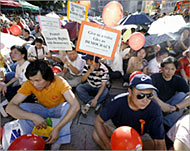Setback for HK democracy hopes
Hong Kong’s democracy movement on Wednesday suffered a major setback after Beijing effectively slapped down any hopes of full democracy within the next three years.

After three days of meetings with a Hong Kong taskforce charged with seeking the Chinese leadership’s views on universal suffrage in the city by 2007, the central government declared democracy would have to wait.
The government said it would have the final say on political change, according to the official Xinhua news agency.
“The high degree of autonomy for Hong Kong meant self-governing under the authorisation of the central government,” the Xinhua report quoted the government as saying.
“The political system of Hong Kong should meet with the legal status of Hong Kong as a regional administrative zone directly under the central government,” it went on.
The city’s status as an autonomous region within China was established during sovereignty negotiations between former colonial master Britain and China in the 1980s.
|
“The high degree of autonomy for Hong Kong meant self-governing under the authorisation of the central (Chinese) government” Chinese government |
At the handover in 1997, it was decreed Hong Kong should be governed according to the principle of “one country, two systems”, meaning it could maintain its capitalist economy within the framework of a “one China” doctrine.
Tuesday’s declaration, however, stressed that maintaining “one country” was more important than preserving “two systems”.
“‘One country’ was the premise of ‘two systems’,” the Xinhua report said, “and it was the Hong Kong people with patriots as the main body that governed Hong Kong.”
A strident opinion
The constitutional reform taskforce, led by Hong Kong’s top civil servant Chief Secretary Donald Tsang, was created by Hong Kong Chief Executive Tung Chee-hwa early last month after street protests calling for a speedier transition to universal suffrage.
The chief executive is currently appointed by an 800-strong
election committee approved by Communist Party leaders in Beijing and the legislature is only partly elected by the public.
 |
|
Pro-democracy demonstrators |
Monday’s declaration was the most strident opinion offered by the Chinese leadership on the fate of democracy in the city since 1997 and it brings to a head a dispute that has been threatening since then.
It even took the moderate South China Morning Post newspaper by surprise, which said in an editorial the statement was designed to dampen expectations of democracy.
It questioned the proviso that “patriots” should govern Hong Kong, saying this was not conducive to system of universal suffrage.
Tsang, who looked dejected and harried after each round of talks in Beijing, was to report to the city’s legislature on Wednesday on his mission.
He is expected to face questions over the trip, especially on
why he was unable to meet senior officials, an issue that has opened him up to ridicule.
|
“We are not surprised. We have to ensure that democrats have a bigger impact in the September legislature elections – if we win a majority then Beijing will not be able to ignore us” Lee Wing-tat, |
Fuelling the debate on democracy is the Basic Law, the city’s mini-constitution, which only prescribes the means for electing the chief executive and legislature up to 2007.
About elections after that, it is vague: it says the form the polls take may be changed if there is a need to do so.
Democrats argue there is a need for a change, while the government has maintained it will consult Beijing.
The Beijing leadership’s contradictory directives on the issue, however, has until now kept everyone guessing on its stance.
“We are not surprised by this,” said Lee Wing-tat, a former
legislator and election campaign manager for the Democrat Party, the leading pro-democracy group in Hong Kong. “There’s nothing here we had not expected.
“However, it does mean we have to ensure that democrats have a bigger impact in the September legislature elections – if we win a majority then Beijing will not be able to ignore us.”